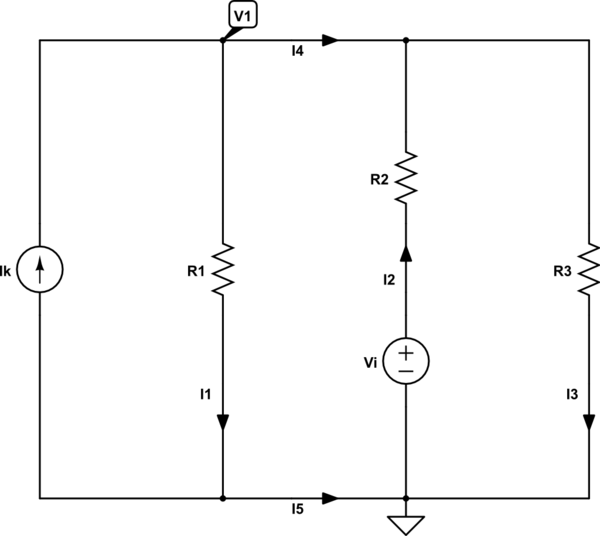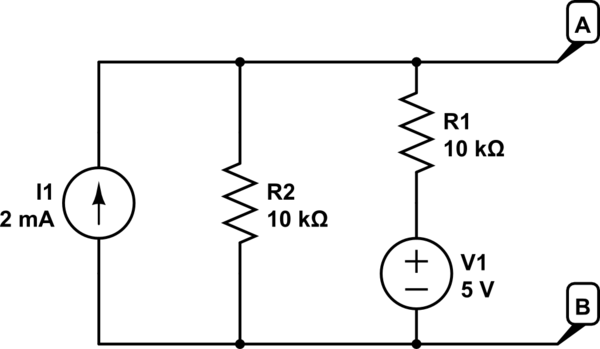First, I will present a method that uses Mathematica to solve this problem because you already have a very good answer by @Andyaka. When I was studying this stuff I used the method all the time (without using Mathematica of course).
Well, we are trying to analyze the following circuit:

simulate this circuit – Schematic created using CircuitLab
When we use and apply KCL, we can write the following set of equations:
$$ \begin{cases} \text{I}_\text{k}=\text{I}_1+\text{I}_4\\ \\ \text{I}_3=\text{I}_2+\text{I}_4\\ \\ \text{I}_2=\text{I}_3+\text{I}_5\\ \\ \text{I}_1=\text{I}_\text{k}+\text{I}_5 \end{cases}\tag1 $$
When we use and apply Ohm's law, we can write the following set of equations:
$$ \begin{cases} \text{I}_1=\frac{\text{V}_1}{\text{R}_1}\\ \\ \text{I}_2=\frac{\text{V}_\text{i}-\text{V}_1}{\text{R}_2}\\ \\ \text{I}_3=\frac{\text{V}_1}{\text{R}_3} \end{cases}\tag2 $$
Now, we can set-up a Mathematica-code to solve for all the voltages and currents:
In[1]:=FullSimplify[ Solve[{Ik == I1 + I4, I3 == I2 + I4, I2 == I3 + I5, I1 == Ik + I5, I1 == V1/R1, I2 == (Vi - V1)/R2, I3 == V1/R3}, {I1, I2, I3, I4, I5, V1}]] Out[1]={{I1 -> (R3 (Ik R2 + Vi))/(R2 R3 + R1 (R2 + R3)), I2 -> (-Ik R1 R3 + (R1 + R3) Vi)/(R2 R3 + R1 (R2 + R3)), I3 -> (R1 (Ik R2 + Vi))/(R2 R3 + R1 (R2 + R3)), I4 -> Ik - (R3 (Ik R2 + Vi))/(R2 R3 + R1 (R2 + R3)), I5 -> -Ik + (R3 (Ik R2 + Vi))/(R2 R3 + R1 (R2 + R3)), V1 -> (R1 R3 (Ik R2 + Vi))/(R2 R3 + R1 (R2 + R3))}}
Now, we can find:
- \$\text{V}_\text{th}\$ we get by finding \$\text{V}_1\$ and letting \$\text{R}_3\to\infty\$: $$\text{V}_\text{th}=\frac{\text{R}_1\left(\text{V}_\text{i}+\text{I}_\text{k}\text{R}_2\right)}{\text{R}_1+\text{R}_2}\tag3$$
- \$\text{I}_\text{th}\$ we get by finding \$\text{I}_3\$ and letting \$\text{R}_3\to0\$: $$\text{I}_\text{th}=\text{I}_\text{k}+\frac{\text{V}_\text{i}}{\text{R}_2}\tag4$$
- \$\text{R}_\text{th}\$ we get by finding: $$\text{R}_\text{th}=\frac{\text{V}_\text{th}}{\text{I}_\text{th}}=\frac{\text{R}_1\text{R}_2}{\text{R}_1+\text{R}_2}\tag5$$
Where I used the following Mathematica-codes:
In[3]:=FullSimplify[ Limit[(R1 R3 (Ik R2 + Vi))/(R2 R3 + R1 (R2 + R3)), R3 -> Infinity]] Out[3]=(R1 (Ik R2 + Vi))/(R1 + R2) In[4]:=FullSimplify[Limit[(R1 (Ik R2 + Vi))/(R2 R3 + R1 (R2 + R3)), R3 -> 0]] Out[4]=Ik + Vi/R2 In[4]:=FullSimplify[%3/%4] Out[4]=(R1 R2)/(R1 + R2)
Using your values we get:
- $$\text{V}_\text{th}=\frac{25}{2}=12.5\space\text{V}\tag6$$
- $$\text{I}_\text{th}=\frac{1}{4000}=0.0025\space\text{A}\tag7$$
- $$\text{R}_\text{th}=5000\space\Omega\tag8$$



